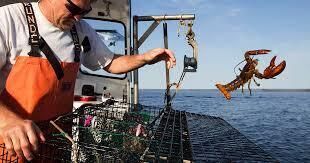
The Atlantic States Marine Fisheries Commission (ASMFC), which oversees certain species along the Atlantic coast, recently attempted to implement a change over the next two years that would increase the minimum size for catchable lobsters in states including Maine and New Hampshire. The regulation would address a significant decrease in the number of juvenile lobsters.
Lobsters are harvested based on their size using a tool that measures the back of the shell. Increasing the minimum length will assure more egg laying lobsters caught will be thrown back into the waters.
Cheri Patterson, chief of Marine Fisheries at New Hampshire Fish and Game, has said the regulation is “ backed by science. The more eggs you get out there, the more young they will hatch."
Yet both Maine and New Hampshire are refusing to comply with the new regulation. Why?
Because, according to its opponents, it would decrease the overall lobster haul by a third this year, dealing a devastating blow to the livelihood of many lobstermen and women along the coast.
Newly-elected Governor Kelly Ayotte, has declared New Hampshire will not abide by the new regulation stating:
“Complying with these guidelines could lead to a loss of a third of lobstermen's catch this year at a time when lobstermen are already facing declining yields.”
Does anyone else besides me see the irony, or rather absurdity, of this statement?
But who can blame the Governor? Savvy elected officials who want to remain in power make decisions that keep their voter base happy.
It's a situation affecting all types of declining natural resources. Decisions are made out of immediate self-interest (oftentimes one’s livelihood) that in all probability will have broader long-term negative consequences for both the natural resource and the consumers of that resource. No one wants more regulations. Yet, as we consume more resources and pollute more waste, unless we want to destroy our planet, we will continue to see more guardrails (regulations) on our consumption, whether that be on shellfish, water use, property development or a host of other economic activities. Indeed, these regulations are restrictions, restrictions on our freedoms, yet the real culprit is growth. Regulations are a byproduct of growth, growth that signals we have exceeded the carrying capacity of our environment.
Despite all of that, and the gravity of the situation, it is difficult for humans to navigate the abstract. In all likelihood, we will keep on doing what we have been doing - resisting regulations, harvesting and eating more lobster and getting more votes, until we can’t anymore.

